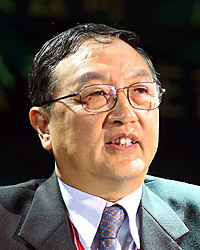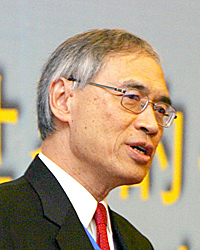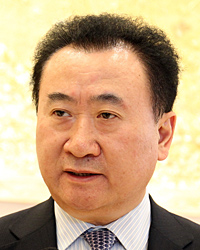| Outstanding Entrepreneur

Liu Chuanzhi, Board Chairman of China's largest PC maker Lenovo Group, has received the 2010 Entrepreneur for the World Award in the Entrepreneur category of the World Entrepreneurship Forum.
The World Entrepreneurship Forum is the first global think tank dedicated to entrepreneurs and creators of wealth and social justice.
Liu showed his ability in building his career, quality as a leader and his global vision, and Lenovo was a perfect representative of Chinese corporations experiencing an international boom, said judges.
Liu, 66, created Lenovo in 1984, along with 10 other engineers in Beijing, with 200,000 yuan ($29,412.) Under Liu's leadership, Lenovo, which was originally known as Legend, rose from a small start-up to become the leading PC company in China and then a global company. In 2005, Lenovo acquired IBM's Personal Computing Division. Today, Lenovo is the fourth largest PC manufacturer worldwide with a total income of $16 billion in 2009.
CIC's HK Boss

Lawrence J. Lau, a prominent Hong Kong economics professor, has been appointed board chairman of CIC International (Hong Kong) Co., the newly established wholly-owned subsidiary of the China Investment Corp. (CIC), the country's sovereign wealth fund.
Lau, 66, served as vice chancellor of the Chinese University of Hong Kong from 2004 to 2010 and is a member of the International Advisory Council of the CIC.
With a Ph.D. in Economics from the University of California, Berkeley, Lau had worked at Stanford University since 1966 and headed the Stanford Institute for Economic Policy Research from 1997 to 1999. In 1966 he developed one of the first econometric models in China, and has continued to revise and update it since then.
The CIC was founded in September 2007 to mitigate risks in China's huge foreign exchange reserves. The Ministry of Finance issued 1.55 trillion yuan ($208 billion) worth of special treasury bonds to buy forex reserves and injected the funds into CIC.
Generous Donor

Wang Jianlin, Board Chairman and President of Wanda Group, based in Dalian, northeast China's Liaoning Province, has donated 1 billion yuan ($150 million) from his personal finances for the restoration of the Grand Bao'en Temple in Nanjing, Jiangsu Province. The donation is the all-time largest from an individual donor on the Chinese mainland.
Wang said his donation was out of respect toward traditional Chinese culture, even though he is not a Buddhist. The donation he has promised will be presented to the China Charity Federation by December and the federation will transfer the funds to Nanjing.
Wang, 56, became board chairman and president of Wanda Group, one of Asia's largest property developers, in 1993. With a total fortune of 28 billion yuan ($4.18 billion), he ranks 16th on Forbes magazine's 2010 China Rich List. The Wanda Group's website says, over the past 20 years, 2.7 billion yuan ($403 million), either from Wang's personal wealth or company profit, has been given out in philanthropy.
The Grand Bao'en Temple, first built in 1412, was destroyed in war in 1854. In August 2008, part of Buddha's parietal bone was unearthed in the temple.
"As different social and cultural traditions exist in different countries, we fully respect the various concerns of each country. Our goal is to find common ground to cooperate to fight cyber crime while safeguarding network security."
Qian Xiaoqian, Vice Minister of the Information Office of China's State Council, calling for increased international efforts to safeguard network security at the opening ceremony of the Fourth U.S.-China Internet Industry Forum on November 8
"The responsibility of lawmakers is to urge the government to take concrete steps to meet its promises."
Chen Zhili, Vice Chairwoman of the Standing Committee of the National People's Congress, China's top legislature, on November 6 revealing China is drafting a law on combating climate change
"It is not that the Americans have not pumped enough liquidity into the market and now to say let's pump more into the market is not going to solve their problems."
Wolfgang Schaeuble, German Finance Minister, questioning U.S. easy money policies, after the U.S. Federal Reserve announced it would spend $600 billion to buy government bonds, in the hope the cash injection will kickstart the country's economy
"Stability there redounds to stability in the region."
Benigno Aquino, President of the Philippines, on the significance of Myanmar's first election in 20 years, which was held on November 7, for the Southeast Asian region
"I would strongly advise the governments not to allow long-term unemployment to build up by providing direct subsidized work experiences to the unemployed after nine to 12 months of unemployment."
Christopher Pissarides, Nobel Economics laureate, suggesting unemployment benefits should be limited to a maximum of one year to ward off long-term joblessness
"I struggled with myself, I struggled with my own pain, but I made it to the finish line."
Edison Pena, the Chilean miner, who completed the New York City Marathon less than a month after he was rescued from the collapsed mine
"We are not claiming that bilingualism in any way prevents Alzheimer's or other dementia, but it may contribute to cognitive reserve in the brain, which appears to delay the onset of Alzheimer's symptoms for quite some time."
Fergus Craik, researcher with Baycrest's Rotman Research Institute in Canada. Scientists there found speaking two languages may help delay the onset of Alzheimer's symptoms by up to five years | 